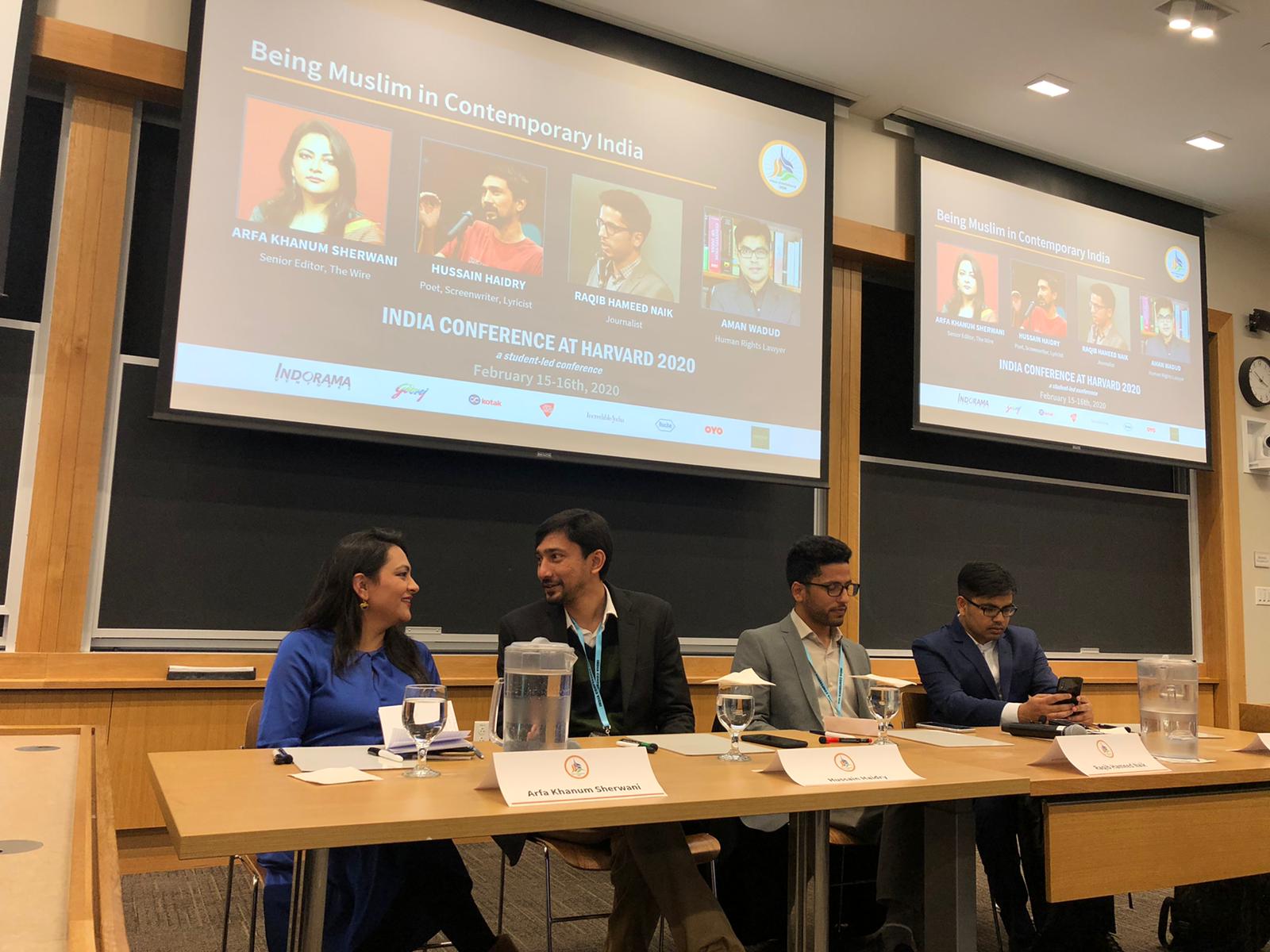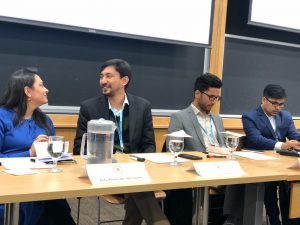"Upper caste Hindus need Shaheen Bagh in their gated colonies to counter Modi"

TCN Staff Reporter
Cambridge, Massachusetts: The fight to save Indian democracy against the onslaughts of the Nazi-inspired groups like RSS and BJP, can be won only when not only Muslims but even the upper caste and upper class lead a protest in gated communities of India, said poet and screenwriter Hussain Haidry. He was speaking on “Being Muslim in contemporary India” at the Harvard India conference on Saturday, February 15. Other members of the panel were Arfa Khanum Sherwani, Raqib Hameed Naik, and Aman Wadud.

“I have sharp criticism on this and I might get lots of criticism for saying this but there have to be protests in gated communities, in upper-caste and upper-class colonies of India. It is the Ashish Nagars that have to have the protests. Rahul Sharma will have to protest because the upper caste and upper class have the most amount of power,” he said provoking applause from the audience for his straightforwardness. But he didn’t make the point without thanking the “allies.”
“I am very glad that a lot of upper caste and upper-class people are our allies and we are extremely grateful for that but there has to be more because if the regime has to be countered, the counter movement has to be supported a lot more by the majority community as well,” added Mr. Haidry who wrote lyrics for Bollywood films like Gurgaon, Qarib Qarib Single, and Mukkabaaz. Haidry shot to fame when his poem "Hindustani Musalmaan” went viral on social media. Later he left his job as head of finance with a health care firm in Kolkata and moved to Bombay to become a full-time writer.
Mr. Haidry said that the dehumanization of India’s Muslims have been done through words.
“Language has been mutilated so as to spread a certain kind of hate and bigotry among the people of India. A lot of it has to do with words. If it is an election campaign they come up with words like ‘abki Baar Modi sarkaar’ and that is a good enough selling pitch. ‘Mandir wahin banayenge’ is good enough to raze a mosque down to the ground. ‘Desh ke gaddaron ko goli maro saalon ko’, rhymes, is musical. It is fanatical but it also rhymes,” he explained how words become “genocidal.”
“Zeher jis bhasha me phailaya ja raha hai hume usko usi bhasha me counter karna hai (We need to counter the hate in the same language it is being spread in.) All the beautiful words of India has been distorted. 'Secular' became 'sikular', and 'liberal' became 'libtard',” he added.
“So if they say ‘Desh ke gaddaron ko goli maro saalon ko’, I say Desh de gaddaron ko Satta se hatao salen ko (remove the traitors from power). Desh ke gaddaron ko/vote na dena saalon ko. (Don’t vote for them,” he said with a member of an audience adding “school bhejo salon ko (Send these rascals to school).”
Haidry highlighted that one needs to look beyond the dehumanization and romanticization of the protesters at Shaheen Bagh.
“The protests involve lots of pain. There is no cushion for these protesters. They are sitting there sometimes on just a mat for hours and hours. You try sitting in the mat for ten hours, your bones will feel the chill. There is no washroom nearby. A lot of the protesters has to take medicines. These facilities are not at their disposal but they have to do,” he added.
Raqib Hameed Naik, a Kashmiri journalist who has extensively reported on human rights abuses in Kashmir including forced disappearances and lethal use of non-lethal weapons on protesters in Kashmir, was part of the panel to present the Kashmiri perspective on the subject.
He said that the ruling BJP used the pain of Kashmiri Pandits as a weapon to communalise the conflict in Kashmir. He recounted the fear and trauma of his family members who were attacked in Jammu after Pulwama attack so much so that that they had to flee from their homes, cross the nearby river and take refuge in the house of a Sikh friend for several days.
He said that Islamophobia and anti-Muslim bias has become a “fashion statement” in India and Indian discourses. He talked about how the Indian state continuously dehumanized people from Kashmir which always led to attacks on them across the country. “That language of dehumanization which is being used against Muslims, have always been used against Kashmiris too.”
In particular, Mr. Naik referred to the recent statements of the Consul General of India in New York advocating that India should follow Israel model of establishing settlements in Kashmir.
“An Indian diplomat talks about making Israel style settlements in Kashmir. This is a genocidal language that we should be concerned about. We need to call it out as it is,” he added
On questions of democracy in Kashmir, Mr. Naik answered, “Nearly 70000 dead, 8K to 10K enforcedly disappeared, 2700 unknown graves, 1500 half widows and 8000 youths blinded in last 8 years and you still call India a democracy?”
Aman Wadud, a prominent human rights lawyer from Assam, explained in detail how despite the rhetoric of Narendra Modi and Amit Shah, the CAA will affect not only Muslims but also poor and different groups of marginalized people across the country. He recounted two incidents to highlight how the fear over CAA took over the lives and psyche of people in India.
“A professor of the prestigious Jawaharlal Nehru University called me when NRC was implemented only in Assam, saying that the names of his father was abbreviated in one certificate as MD and was mentioned as Mohammad in another. He was clearly nervous and asked me how is he going to be affected and what to do,” he said in order to explain the extent of fear among people.
“In another incident, I got a call from a young man from a poor family informing me that his mother is being sent to detention centers and that she told him not to ‘waste’ money on her legal fee as they didn’t have money. It was heartbreaking but let me tell you this is just one among thousands of such cases in Assam,” he said adding that such heart-wrenching stories might become a national phenomenon.
“Your citizenship has been questioned to the extent that it can be stripped off. The CAA can’t be read in isolation. It’s a lethal weapon with NPR as the Modi government intends it to be,” added Mr. Wadud.
He strongly asserted that everyone must protest against the CAA because it is going to affect everyone and everyone will be harassed on the pretext of documents.
“I can talk about two major reasons for that. The NPR enumerator can declare anyone doubtful citizen if he/she has any doubt while taking the data. And secondly, suppose even if you are Hindu and will finally be given citizenship through CAA, but will you erase your history in India if you don’t have the documents. What will you say which country you came from?,” he asked.
Arfa Khanum Sherwani, the senior editor with The Wire, said that increasing awareness of one’s Muslim identity is one of the contributions of the Modi government. Talking about the difference Modi government brought about in a Muslim reporter’s life, she said, “ Being a reporter and also being a subject of the reporting. That’s new.”
She said the project of “dehumanization and demonization” of Muslims was done in the first term of the Modi government through “communalisation of crimes” where accused with Muslim names become focus of national media; Muslim men are projected as incapable of loving women by propaganda terms like ‘love jihad’; demonize Muslim men and patronize Muslim women.
“In the second term post-2019 the government is capitalizing on that dehumanization,” she said while explaining how the dehumanisation of Muslims makes them sub-human in popular media and facilitates easy trampling on their human rights by the government.
In the first term marginalization of Indian Muslims was “informal” but post-2019 it’s “legitimized and legal.” She also talked about the “silver line” of the protest against the Citizen Amendment Act. Muslim women stepped out of the kitchen and transitioned to protest site, is indicative of the reforms that the society was waiting for.
The panel discussion concluded with Haidry reciting his viral poem.
